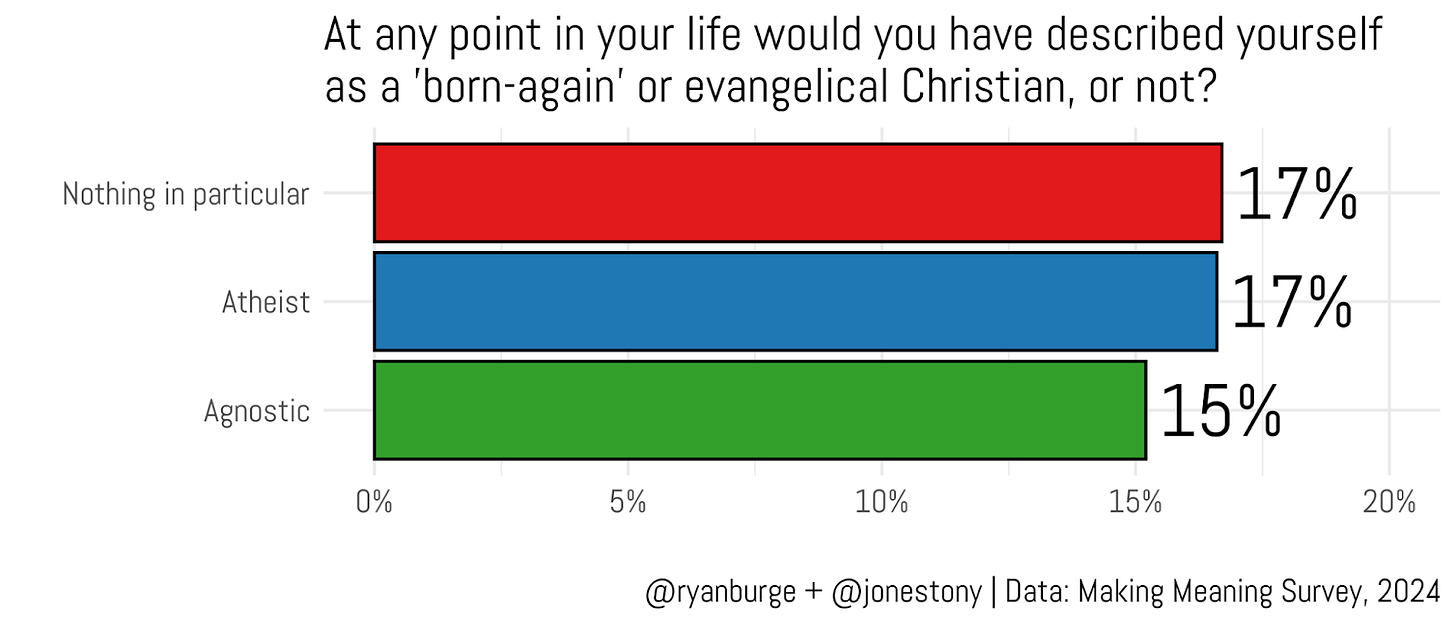How Many Nones are Exvangelicals?
Lotta books, lotta tweets. But is this the norm?
A couple of months ago, Katelyn Beaty wrote a terrific post for her Substack with the title: When Deconstruction Becomes a Brand. It’s a post that only she could write because she’s got a better view of the Christian ‘thought industry’ than almost anyone as she’s the editorial director for Brazos Press. Beaty writes, “I’ve started to feel in the past few years that deconstruction has become a brand. In a crowded digital media market, it’s a way for content creators to clearly identify their niche and reach a growing audience.” (Full disclosure - my forthcoming book The Vanishing Church is being published by Brazos and it’s absolutely not about deconstruction.)
Katelyn writes insightfully about how terms like ‘exvangelical’ have almost become a shibboleth for publishing a book in this space. The more the term is invoked, the higher the likelihood of getting a book contract. But here’s the thing - no one really knows how many exvangelicals there are in the United States. In fact, I don’t think there’s even an accepted definition of the term. Is it folks who once identified as evangelicals but don’t now even though they may still go to church? Or people who were evangelicals but have left religion behind entirely?
When Tony Jones and I set out to write our Making Meaning survey (funded by the John Templeton Foundation), we wanted to be able to get our arms around the concept of exvangelical nones. To that end, we asked all kinds of questions about evangelical identity and the overall religiosity of one’s childhood home to get a better sense of what factors actually drive someone to leave evangelicalism and embrace a non-religious identity like atheist, agnostic, or nothing in particular.
Let’s just start with the most basic question here: At any point in your life would you have described yourself as a ‘born-again’ or evangelical Christian, or not?
Well, look at that. In this data what we found is simply this - not very many atheists would have ever called themselves evangelical at any point in their lives. The same was true for agnostics as well as those who described their religion as ‘nothing in particular.’ Only about 16% of nones today were evangelical at any point in their lives.
Said another way, there’s just not any strong evidence in the data that the ranks of the nones are swelling because of a rejection of evangelicalism. It certainly is a part of the religious history of some nones in the United States because it absolutely is not common to find an exvangelical atheist or agnostic. It’s a distinct (but incredibly vocal) minority.
However, I think we can all admit that it’s the young adults who are driving this conversation about exvangelicalism. You don’t see a lot of Boomers tweeting about deconstruction. So, that’s something that’s pretty interesting to explore. I just redid the prior analysis by generations and I have to admit that this data is pretty surprising.



